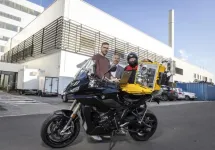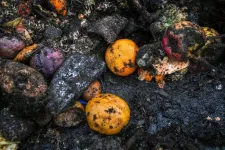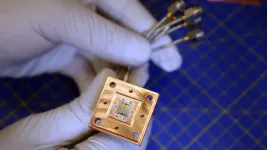(Press-News.org) Given that today’s children will inherit the consequences of climate change, schools are instrumental in mobilizing a global response to the climate crisis, a science educator argues.
Climate literacy advocate Kelley T. Lê argues that climate change is the defining issue of our time, and in her new book, Teaching Climate Change for Grades 6–12: Activating Science Teachers to Take on the Climate Crisis Through NGSS, Lê provides teachers, administrators, and global leaders with practical tools to empower students as climate leaders in their communities.
With over 15 years of experience in science education, Lê draws on her work as a teacher, instructional coach, and educational leader. Her advocacy for climate literacy has earned national recognition, including the Friends of the Planet Award from the National Center for Science Education.
A Blueprint for Transformation
The climate crisis is no longer a future concern but is occurring in real-time. However, on average, schools dedicate only one to two hours per year to climate-specific education. Many young people are ill-equipped to understand or respond to this critical issue, according to Lê, who suggests schools are the perfect place to fix this issue by empowering students to become informed decision-makers and change agents.
In Teaching Climate Change for Grades 6–12, Lê, Executive Director of the Grades of Green Nonprofit and former inaugural Executive Director of the UC-CSU Environmental and Climate Change Literacy Projects, advocates for action. Using practical tools to teach climate science, this timely resource equips educators with the tools to teach climate change and foster students’ hope and resilience.
The book includes custom guides that help teachers address the complexity of climate change while tying the concept to urgent social and environmental justice issues. By linking lessons to climate events and culturally relevant teaching, Teaching Climate Change for Grades 6–12 transforms science education into a tool for empowerment.
“Education is the Hidden Superpower in the Fight Against Climate Change”
Lê believes education is the key to tackling the climate crisis: “Teachers have a unique opportunity to inspire and empower students to take meaningful action against climate change. This isn’t just about teaching science—it’s about equipping the next generation with the tools they need to build a sustainable and just future. Education has the power to catalyze change, and that work begins in our classrooms.”
The book comes at a critical time as climate literacy becomes an increasingly urgent global priority. Recent surveys show that while 90% of high school students believe climate change is happening, many lack the knowledge to explain its causes and consequences. Teachers are the bridge, bringing awareness and action and providing students with the skills to confront these challenges head-on.
Strategies to Empower Students in Addressing the Climate Crisis
NGSS Alignment: This book inspires teachers to incorporate real-world climate phenomena into their lessons, aligning with Next Generation Science Standards (NGSS) while captivating students in enriching and impactful learning experiences.
Equity and Justice Focus: It highlights the disproportionate impact of climate change on marginalized communities, encouraging teachers to address these issues through culturally responsive practices.
Student Agency: By linking classroom lessons to actionable solutions, the book empowers students to become advocates for change in their communities. END
Science educator calls for climate change to be taught more in US schools
2025-01-09
ELSE PRESS RELEASES FROM THIS DATE:
Realistic emission tests for motorbikes, mopeds and quads
2025-01-09
The emissions scandal in the automotive industry that came to light in 2015 has set many things in motion. Last but not least, the discussion about the need for realistic tests for vehicles in order to correctly determine their pollutant emissions instead of just testing on test rigs. Such tests and the applicable emission limits are now required by law for cars, but not for so-called category-L vehicles (mopeds, motorbikes, tricycles and quads). As part of the “LENS” project (L-vehicles Emissions and Noise mitigation Solutions) funded by the European ...
Race- and gender-based microaggressions linked to higher post-birth blood pressure
2025-01-09
Research Highlights:
More than one-third of Asian, Black and Hispanic women in the study group reported experiencing at least one microaggression related to race and gender during or after their pregnancy.
The link between racial microaggressions and postpartum blood pressure was strongest 10 or more days after delivery, when the blood pressure may be monitored less often, the researchers noted.
The researchers also noted that these types of gendered racial microaggressions can raise blood pressure postpartum and suggest blood pressure monitoring and/or treatment for high blood pressure may need to ...
Novel ‘quantum refrigerator’ is great at erasing quantum computer’s chalkboard
2025-01-09
If you’d like to solve a math problem on a good old-fashioned chalkboard, you want the board clean and free of any previous markings so that you have space to work. Quantum computers have a similar need for a clean workspace, and a team including scientists at the National Institute of Standards and Technology (NIST) has found an innovative and effective way to create and maintain it.
The research effort, a collaboration with physicists at Sweden’s Chalmers University of Technology, could address one of the main issues confronting quantum computer designers: ...
States struggle to curb food waste despite policies
2025-01-09
The United States generates more food waste than all but two countries. To address this, the federal government set a goal to cut food waste in half by 2030 compared to 2016 levels, to about 164 pounds per person annually. But a new study published in Nature Food and led by University of California, Davis, reveals that current state policies are falling short. Since 2016, per capita food waste has increased instead of decreasing.
“We’re just five years away from 2030 so it’s quite alarming how ...
Record cold quantum refrigerator paves way for reliable quantum computers
2025-01-09
Quantum computers require extreme cooling to perform reliable calculations. One of the challenges preventing quantum computers from entering society is the difficulty of freezing the qubits to temperatures close to absolute zero. Now, researchers at Chalmers University of Technology, Sweden, and the University of Maryland, USA, have engineered a new type of refrigerator that can autonomously cool superconducting qubits to record low temperatures, paving the way for more reliable quantum computation.
Quantum computers have the potential to revolutionise fundamental technologies in various sectors of society, with applications in medicine, energy, encryption, AI, and logistics. While the building ...
New discovery makes organic solar cells more efficient and stable
2025-01-09
EMBARGO 9.1.2025
New discovery makes organic solar cells more efficient and stable
Researchers at Åbo Akademi University in Finland have identified and eliminated a previously unknown loss mechanism in organic solar cells that makes them more efficient and gives them a longer lifetime. The results provide new insight into how efficiency and stability can be increased in the future.
The work of the Organic Electronics Research Group at Åbo Akademi University was carried out in cooperation with Professor Chang-Qi Ma's group at Suzhou Institute ...
What we eat affects our health — and can alter how our genes function
2025-01-09
Fiber is well known to be an important part of a healthy diet, yet less than 10% of Americans eat the minimum recommended amount. A new study from Stanford Medicine might finally convince us to fill our plates with beans, nuts, cruciferous veggies, avocados and other fiber-rich foods. The research, which will be published in Nature Metabolism on Jan. 9 identified the direct epigenetic effects of two common byproducts of fiber digestion and found that some of the alterations in gene expression had anti-cancer actions.
When we eat fiber, the gut microbiome produces short-chain fatty ...
Lung cancer test predicts survival in early stages better than current methods
2025-01-09
ORACLE test predicts overall cancer survival independent of currently used clinical risk factors, and it has the best predictive power in stage 1 lung cancer.
A high ORACLE score is associated with a higher risk of cancer spread.
ORACLE could potentially be used to pick out patients who would benefit most from chemotherapy.
Researchers at the Francis Crick Institute, the UCL Cancer Institute and UCLH have shown that a test called ORACLE can predict lung cancer survival at the point of diagnosis better than currently used clinical risk factors. This could help doctors make more informed treatment decisions for people with stage ...
Pioneering new mathematical model could help protect privacy and ensure safer use of AI
2025-01-09
UNDER EMBARGO UNTIL 10 AM GMT / 5 AM ET THURSDAY 9 JANUARY 2025
Pioneering new mathematical model could help protect privacy and ensure safer use of AI
AI tools are increasingly being used to track and monitor us both online and in-person, yet their effectiveness comes with big risks. Computer scientists at the Oxford Internet Institute, Imperial College London, and UCLouvain have developed a new mathematical model which could help people better understand the risks posed by AI and assist regulators in protecting peoples’ privacy. The findings have been published today (9 January) in Nature Communications.
For ...
Floods, droughts, then fires: Hydroclimate whiplash is speeding up globally
2025-01-09
Key takeaways
Hydroclimate whiplash – rapid swings between intensely wet and dangerously dry weather – has already increased globally due to climate change, with further large increases expected as warming continues, according to a team of researchers led by UCLA’s Daniel Swain.
The “expanding atmospheric sponge,” or the atmosphere’s ability to evaporate, absorb and release 7% more water for every degree Celsius the planet warms, is a key driver of the whiplash.
Co-management of extreme rainfall or extreme droughts, ...



